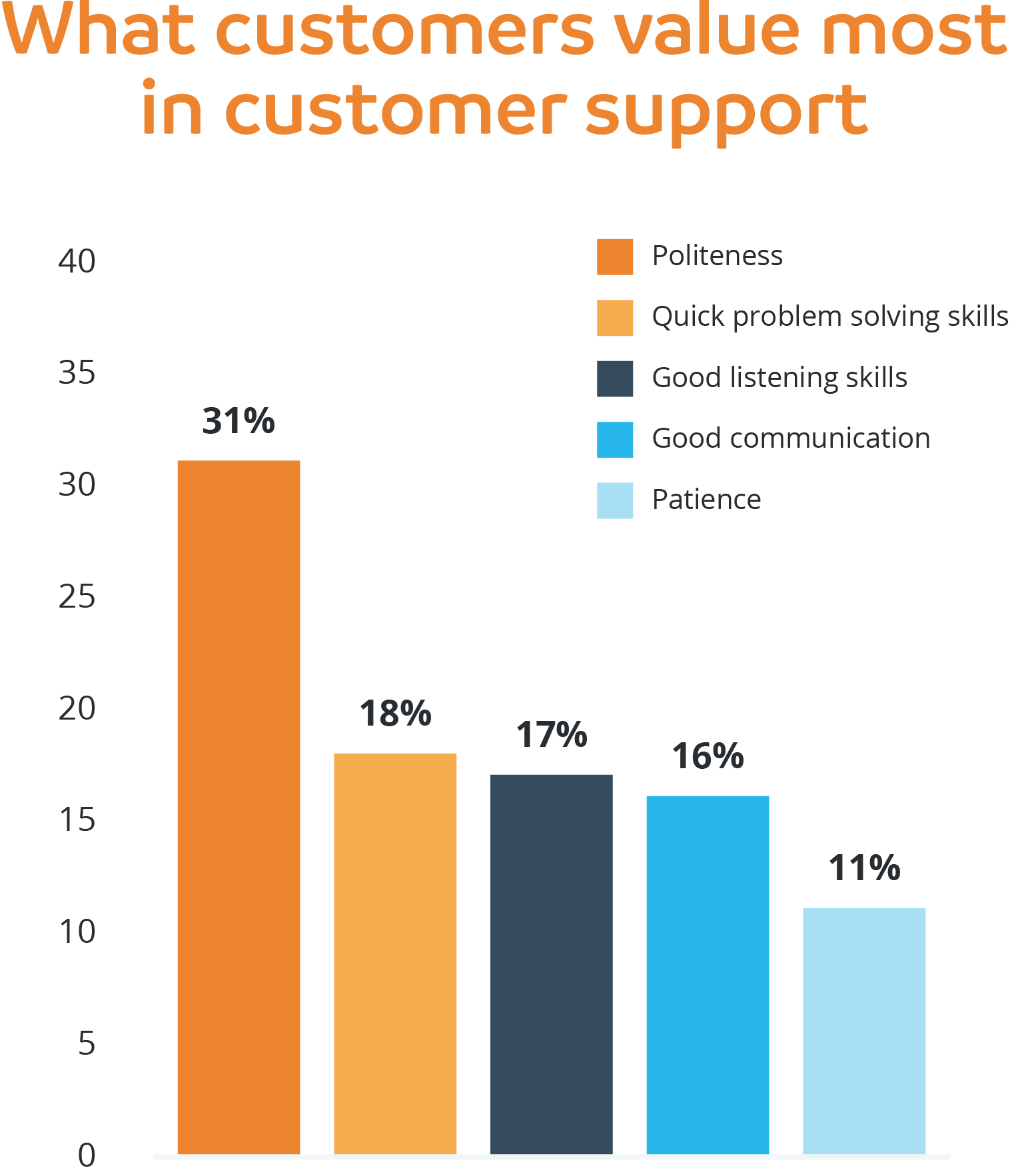How to choose the right offshore provider for 24/7 customer support
Leading consultancy firm McKinsey & Company did not mince its words earlier this year when reflecting on the state of the customer service world. “Customer care leaders are facing their greatest challenge in decades,” it declared in a report revealing the results of its largest-ever survey into the topic1. “They must prepare their organizations for an AI-enabled future while simultaneously meeting tough commercial targets and rising customer expectations. Our latest global survey suggests that many companies are struggling on all these fronts.”

Such a sentiment would come as no surprise for business leaders charged with delivering customer service in the 2020s. Where price and product quality were once the main drivers for purchase decisions, almost three-quarters of modern consumers say customer experience is more important2 and 68% are willing to pay more for goods and services from brands known to offer good customer service3.
Which is all well and good except, as noted by one industry expert: “Delivering a superior customer experience comes at a cost.”4
Between investing in CX technology, staff training, data analytics and monitoring tools, customer experience can be a costly business and that is without even factoring in demand for round-the-clock support. Research has found that 57% of customers expect the same response time at night and on weekends as during normal business hours5, which is concerning news for businesses already doing their best to navigate rising costs and shrinking budgets.
Fortunately, there is a resourcing strategy that has been shown to improve productivity, reduce costs and increase consumer satisfaction when it comes to customer service. For many businesses, the solution lies with partnering with offshore providers that specialize in 24/7 customer support.
What is outsourced 24/7 customer support?
Outsourced 24/7 customer support sees organizations partner with external providers to provide assistance when and how individual customers want to access it. This can include facilitating a range of options such as live agents, chatbots, knowledge bases and FAQs, with the lower cost of living in many offshore destinations allowing businesses to extend their ability to offer support at any time of the day or night.
What are the benefits of 24/7 customer support?
There are multiple reasons businesses choose to invest in 24/7 customer support including:
- Increased customer satisfaction: there are few things quite like around-the-clock support to make customers feel that their needs are a business’s top priority. The ability to seek assistance when it suits them - and ideally receive a prompt resolution - fosters trust, reliability and immense goodwill. It also helps address issues before they escalate, which all adds up to increase customer satisfaction.
- Improved customer retention: anyone who doubts the importance of quality CX need look no further than a study that found 80% of consumers have stopped doing business with a company due to an experience that frustrated them6. Such frustrations typically extend to an inability to access support the moment the need arises. Providing 24/7 support addresses this and enhances the kind of loyalty that leads to long-term customer retention.
- Increased sales: just as delayed assistance can result in a missed sales opportunity, 24/7 support has been shown to reduce customer hesitation and expedite purchasing decisions. This is particularly so for eCommerce operations, with quick resolutions for the likes of payment failures or login problems crucial for reducing cart abandonment rates and bolstering sales.
- More brand awareness: in a world of Google reviews and social media critics, positive word of mouth has rarely been more important for businesses. Around-the-clock customer support reinforces an organization’s reputation for reliability and creates positive experiences that are more likely to be shared. It also caters to customers across multiple time zones, further broadening visibility and reach.


Source: Why successful customer service strategy is important [Infographic] | Provide Support
What are examples of customer service best practice?
Businesses have a myriad of options to choose from when investing in customer service best practices.
- Self-service: once a novelty, self-service options are now a must for any organization keen to deliver quality customer experience. When it comes to quick, low-priority inquiries, customers increasingly prefer accessing self-service support alternatives such as FAQs, chatbots or knowledge bases that allow them to find the answers they want without needing to engage with human agents.
- Agent training: education lies at the heart of any great organization, hence why businesses should not skimp on training their customer service agents. Along with enhancing their knowledge and confidence, agent training provides them with critical soft skills such as empathy, active listening and problem-solving techniques that are essential for building rapport with customers.
- AI integration: few modern business conversations are complete with mention of AI and it is no different with enhancing customer service. AI-powered tools such as chatbots and virtual assistants not only handle routine queries instantly but the technology can boost personalization by analyzing customer data to deliver tailored solutions and recommendations.
- Develop playbooks: consistent messaging is crucial when handling customer interactions and playbooks provide agents with step-by-step instructions for addressing common issues and navigating difficult situations. They also benefit both new hires and experienced agents, with the former able to get up to speed faster and the latter offered a resource to refresh their knowledge.
- Measure success: there is little point investing in customer service if managers and agents have no way of knowing if that investment is paying off. Measurement tools that track key metrics not only provide essential insights into agent performance, customer satisfaction and areas for improvement but foster accountability by providing clear benchmarks for success.
How can you measure customer support success?
Customer support measurement tools can help identify what a business is doing well, where it is falling behind and how to improve. They include:
- CSAT score: one of the most popular key performance indicators, CSAT (Customer Satisfaction) tracks how satisfied consumers are with an organization’s products and/or services. It is typically collected through surveys that ask multiple questions that rate satisfaction on a scale (eg: 1 to 10) and expressed as a percentage - the higher the percentage, the more satisfied their customer base is.
- Net Promoter Score: this is widely hailed as the gold standard of customer experience metrics and is usually gathered by asking a single question - how likely are you to recommend this company/product/service? A customer base is then broken into three groups - Promoters (highly satisfied and likely to recommend the company), Passives (satisfied but unlikely to promote growth) and Detractors (dissatisfied and potential to share negative feedback).
- Resolution rate: the goal of any customer support agent is to resolve an issue and effectively close the loop. Resolution rates highlight how effective a business is at providing support by dividing the total number of tickets by the number of tickets resolved. Once calculated, customer support leaders can analyze data further to identify inquiries or questions that cause frequent issues.
- Social media monitoring: social media has changed the business landscape, with customers now capable of sharing both positive and negative experiences online in real-time. By actively tracking social media platforms for mentions of their brand, products or services, businesses can quickly identify and respond to customer inquiries or complaints and improve engagement and satisfaction.
- Customer wait time: we all know how frustrating it is to be forced to wait to speak to an agent when reaching out to a business, which is why it is vital to know how often it is happening to one’s own customers. Whether it is measuring in-person wait times (eg: via phone) or online response times, this measurement tool can help identify where customer support resources are best directed.

Source: Customer service: Why employees value customer feedback
How do you choose the right offshore provider for 24/7 customer support?
Outsourcing is an increasingly popular strategy for businesses wanting to enhance their 24/7 customer support offering. However, it is important to consider various factors when choosing an offshore provider.
- Relevant experience: from India and Brazil to the Philippines, there is no shortage of offshore providers keen to assist organizations with their customer service needs. Quality can differ though, which is why it is essential to partner with a team that has experience and expertise in the field. Take the time to do your research, seek testimonials and ask the right questions.
- Access to technology: one of the key benefits of outsourcing is teaming with a provider that boasts customer service technology many smaller businesses can only dream of accessing. Cutting-edge tools and solutions allow their teams to respond quickly, reduce wait times and provide multiple types of support across the day and night.
- Cultural fit: when seeking an offshore provider to support 24/7 customer service, it pays to partner with an organization that culturally aligns with one’s customer base. For example, the Philippines is renowned for being one of the largest English speaking countries in the world and nurturing talents who have many Western cultural similarities.
- Communication: customer service is all about quality communication and the same goes for the relationship between onshore teams and their offshore colleagues. Ensure that your outsourcing provider boasts technology, systems and processes that allow for seamless communication between agents, customers and in-house staff.
- Security and data protection: protecting customer information is paramount for any business and they must take every step to ensure their offshore provider has a similar commitment. Before outsourcing 24/7 customer service, demand that your potential partner has robust data security and stringent compliance controls ingrained into every aspect of their service delivery model.
Conclusion
The days of leaving customer service to chance are long gone, all the more so as consumers demand around-the-clock support. Outsourcing is a proven strategy for helping businesses provide customers with the care they deserve in a cost-effective and highly efficient manner. To return where we began, customer care leaders are facing tough times but, as you’ve just learned, there are ways to ease the load and it starts by looking offshore for support.
Incredibly some business leaders are yet to fully embrace AI-based customer support. Learn how the latest technology can ensure brighter days for both organizations and their customers.
Reference:
[1] Where is customer care in 2024? | McKinsey
[2] pwc-consumer-intelligence-series-customer-experience.pdf
[3] 2018 Customer Service Expectations Survey
[4] The Cost of Customer Experience in 2024: Investing in Customer Satisfaction for Long-Term Success | by Your Customer Experience Consultant | Medium
[5] Customer response times - are you falling short of expectations? - BizSpace
[6] TOP 30+ Customer Experience Statistics to Know in 2024
Popular posts
Browse by topic
- Accounting
- Accounting & Finance
- All Industries
- Banking
- BPO/RPO/HRO
- Communication
- CSR & ESG
- Customer & Client Acquisition
- Customer Experience
- Cybersecurity
- Cybersecurity & Compliance
- Data Management
- Digital Operations
- Digital Transformation
- eCommerce
- Education
- Employee Engagement
- Engineering & Construction
- Financial Services
- Healthcare
- Hospitality and tourism
- HR & Recruitment
- Information Technology
- Insurance
- Legal Services
- Logistics
- Offshoring & Outsourcing
- Outsourcing
- Professional Services
- Real Estate
- Retail & eCommerce
- Startups
- Talent Acquisition and Retention
- Technology
- Trends & Guides
- Workforce Integration
Related Posts
How to manage customer data ethically in eCommerce
Today’s eCommerce operations share much in common. They all rely on the expertise of technical wizards who can turn code into winning platforms. They..
How Insurance Firms Benefit from Outsourcing Amid Industry Challenges
Insurance executives could be excused for feeling an extra weight on their shoulders were they to glance at McKinsey & Company’s latest insight into..
